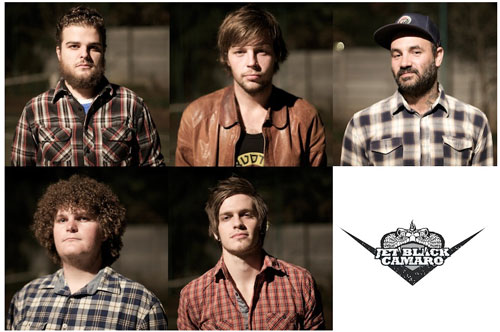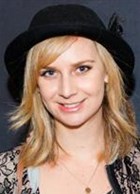You might have thought that that real rock 'n' roll, ballsy, intelligently conscious sound had died a sadly quiet death many years ago, perishing especially so from the hipster-centric generation and gentrification. However the bluesy, soulful rock of Jet Black Camaro might just change your mind. "More Southern than the South", the five members (Gianluca Tadiello (lead guitar), Casjahn Bierman (rhythm guitar), Frans Borman (vocals/harmonica), Miles Askes (bass) Louis Malherbe II (drums) of Jet Black Camaro are on a quest to bring meaning, honesty and soul back to the reality TV generation. We met up with the five to chat music, angry bears and the lament of a nation and generation.
Down for a Cape Town tour and playing in a variety of smaller venues, including diverse spots such as &Union, Perigators in Pringle Bay, The Assembly and even the backpackers they resided in, they have been extremely happy with the response from the Cape Town crowd so far.
Frans: Musicians and promoters have been great, the crowds really respond to you and want to come and talk to you.
Gianluca: We have had a really good reception wherever we played. It's nice to find that we are making connections with people, 'cause that is really what we want to do.
Frans: We custom-make every show, so here we would make it a little more Western and landscape like, atmospheric and another time more blues. Each night so far has had a different flavour... We made a lot of sacrifices, the first two or three years is really hard work; we came down for this tour with R1000 in our bank account for this band. You have to invest a lot and that is the only way. We also don't want to compromise; we want to have an authentic identity.
Gianluca: You never know how the dynamics are going to be with five guys sleeping in one room, but all hung out and pulled through. We joke that the four of us are his [Frans'] girlfriends and he has to take care of all of us.
The band all came about in a very organic way: Loedi van Renen, the original bassist from Taxi Violence started the band with Fano du Plessis. They both eventually left the band after a couple of band member swaps and drop outs. In different stages the current members slowly took over and made it their own.
Gianluca: I think we are more experimental [than the original band] with our sound - not necessarily progressive, but we like to try out different things.
With an obvious influence and inspiration from the Deep South we asked what makes their sound South African and what correlations they see between the Deep South and the South of Africa.
Frans: We're more Southern than the South. We're not trying to copy the hillbillies, we're not going for an image; we have a story to tell. We just want to be ourselves, we want to be authentic.
Gianluca: We draw a lot of influences from SA and we feel that we are not only geographically, but emotionally and culturally, more South then the actual South.
Frans: A lot of the issues are the same, like slavery, religion and racism. I think in the South you are either in a bar, in jail or church. We want to talk about those issues, 'cause we sing about these things, like say for instance religion - like some values in there are good values. We look bad ass, but we've actually got good hearts.
And why the attraction to that Deep South sound?
CJ: It's the adventure.
Frans: For me it's because it's raw. It's got flavour - and also the voodoo mystical element, it's got intrigue.
CJ: The music is very honest.
Frans: It's a style or genre of music in which people can enjoy themselves. It's feel-good, uplifting.
The band travelled 14 long hours to record their debut album in the small town of Ladismith as they felt the rusticity of the town would lend a more authentic sound and inspiration to the recording. The album was recorded in an impressive nine days, with half the members only being able to be present for half of that time.
Frans: It would have lost a lot of its soul if recorded in the city. Our producer [Jo Ellis] deliberately chose the takes in which my voice was raw and sometimes even off key. We put the less-perfect takes in. In the city it would have been a more polished sound and we didn't want a polished sound.
Gianluca: I think Ladismith suits us, we like small rustic towns. We like being off the beaten track. We don't even call our acoustic sets acoustic, we call them detour sets. We are all about the detours in life.
There is no doubt that the band is passionate about what they do and are often frustrated with the lack of support received from the SA music industry and community in general. They explained in depth the problems with the industry and the direction in which they would like to see it grow.
Louis: The problem is the culture; the most popular music is gospel and kwaito. We don't have enough people listening to enough types of music.
Frans: South Africans are scared to be themselves - they follow trends from overseas. With venues and festivals it's just not really about the music anymore.
Gianluca: It's sad that it's more about who you know and how they can benefit from you. And now with those big-time bands you ask them: Can we be your opening act? - and they say: "We don't have opening acts." How are we supposed to build an industry if they don't want to help and just look after themselves?
Louis: I also want to say something about that. You've got all these big bands and they have all the connections, now they split off and make their own little super groups. These people don't have to go through the same steps in building up a rep. There is only so much of the market and they cut you out, they corner it.
Gianluca: But purposefully so. If a band thinks you're better than them they don't want you to steal their show. And that is not how an artistic community should work 'cause most people don't want to see the same band every week, every day, with no different opening acts. They don't want to try to grow and experiment, 'cause they've got this thing they marketed and anyone who tries not even to cut a piece of their pie, but tries to be like them they purposely shove out of the way.
Gianluca: In South Africa you have no support for music. In other countries, like Australia, the government subsidises the music industry because when people are having fun be being entertained, they don't go and burn down cars and things. People need ways to express themselves.
We asked our standard question of what animal would best represent the band and probably got the best response received so far:
Frans: Can we give you a few?
Gianluca: 'Cause each of us has an animal that we think represents us.
CJ: A black mamba.
Frans: A horse, you know for the freedom.
Gianluca: The wolf is a big part of our image; we're into Indian folklore. He's a bear (points at Frans), I'm an owl.
Frans: An angry bear, but gentle at the same time. I would even say a swan because they're delicate. [All round laughter] Make it a crow.
CJ: No an eagle, let's leave the swan out.
Frans: A black swan
Gianluca: That was a good question I liked that one. Yeah, very Jet Black question.
With a band so excited and passionate about what they do and with the willingness to work hard and make the necessary sacrifices, we wanted to find out what the ultimate goal would be for Jet Black Camaro.
Frans: We want to be remembered, like Led Zeppelin, like Jimi Hendrix. It sounds far-fetched, but we don't want to just be big in SA. I don't want to be remembered as one of SA's best bands. We want to be remembered in the Rock and Roll Hall of Fame.
Gianluca: We really want to communicate and share our ideas for the generation. We feel a lot of people feel disenfranchised with how whole the world is turning out, how the arts are overly produced - it's very commercial and we are our own voice, and we want to communicate to those people who feel irritated being force-fed watered-down art. Frans, as a lyricist, deals with a lot of topics... He really digs into the human consciousness and answers questions in his lyrics. He's just the most honest he can be and I think that is very important in a band.
Say no to watered- and dumbed-down music and art, be inspired, be moved, join the Jet Black revolution, download their free self-titled debut album at www.reverbnation.com/jetblackcamaro.
www.facebook.com/jetblackcamaro
twitter.com/JetBlackCamaro





























